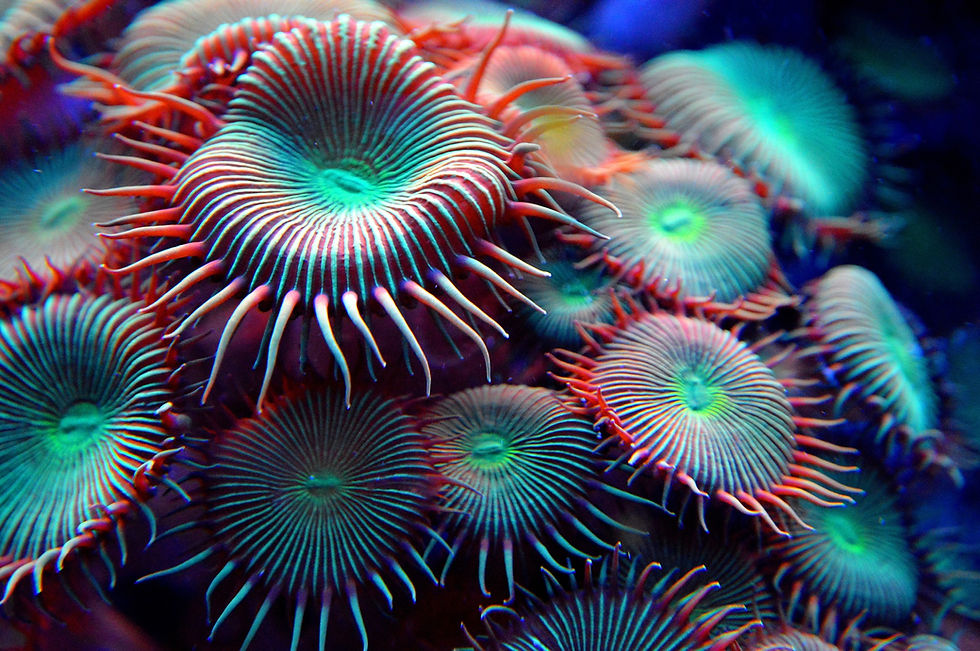Do fish have a language?
- Vasiliki Prestidge
- Dec 21, 2017
- 3 min read

Blue Planet II this year had it all: suspense, humour, sadness but above all, educational value.
I never really used to watch documentaries until now and BBC know how to produce a good one. With high-quality video, perfectly-timed music and nail-biting narrative by David Attenborough, Blue Planet II is not to be missed.

Asian Sheepshead Wrasse (photograph from BBC iPlayer)
I've learnt so much about our oceans and their creatures, that I now see underwater life from an entirely new perspective. For example, did you know that the Barreleye fish has a transparent head so that it can look for predators swimming above it? Or that the Asian Sheepshead Wrasse can change its sex from female to male so that it can mate? Then, there’s the orange-dotted tuskfish that catches clams and uses its coral as a tool to break them open to eat the meat within. Even though these are survival-driven characteristics, they are nonetheless signs of a certain level of intelligence. It makes me wonder: do fish have their own language?

Orange-dotted Tuskfish trying to break open a clam using its coral (photograph from BBC iPlayer)
The language of fish was explored during episode 7. As a linguist, I found it incredibly fascinating. And yes, fish apparently have a language. Marine biologist Steve Simpson studied the sounds of fish living in coral reefs. By listening underwater, he recorded sounds produced by fish to attract mates or scare away predators.
A mix of pops, grunts, gurgles and snaps consist an underwater language. Using an advanced multi-directional hydrophone, Steve tried to analyse this underwater choral arrangement. He’s even attempted to allocate specific sounds to the fish producing them. What’s becoming apparent from the recordings is that some fish talk more than other.

Saddle-back Clownfish (photograph from BBC iPlayer)
The clownfish, for instance, seems to be the most talkative. But what is the purpose of their language? Steve Simpson studied closely a family of saddle-back clownfish during their search for a home for their eggs. According to the documentary, clownfish talk all day long. One of the purposes of their language is to warn each other of predators, such as the coral trout that hunts around the reef.
To test this, Steve used a model coral trout and placed it close to the family’s coral. The fish reacted immediately by producing deeper pulsing sounds. These sounds act as an alarm in an attempt to scare the trout away. The little clownfish release pops to let their mum know that they are still alive. In this case, language is used as a defence mechanism against danger, but also as means of communicating a very important message, that of being safe.
But what happens, when human-caused noise from boats, ships, seaside resorts, etc. interferes with underwater sounds? Can the fish still hear each other? Will the clownfish mum be able to successfully scare away the trout? Is the mother able to hear that her little ones are safe? These are some of the concerns raised, following the discovery and analysis of sounds produced by fish.
So, do fish have a language or is it simply a set of survival-driven sounds? Perhaps, further studies can lead to more sophisticated discoveries that will enhance our understanding of underwater creatures and their language. Besides, just because we don't understand or aren't aware of their language, that does not mean that fish don't have one, right?
Regardless of whether fish have a language or not, one thing is for certain: we now have one more reason to fight noise pollution.
If you haven’t watched Blue Planet II, all 7 episodes of the series are now available on BBC iPlayer.
If episode 7 has upset you and you are concerned about our oceans, here are a few things you can start doing today to help our blue planet.
If you have watched Blue Planet II, what did you think of Episode 7? Do fish have a language?
Tell me in the comments.

Vasiliki is a Consultant, Chartered Linguist, Translator, Interpreter and founder of Greek to Me Translations, a company that helps businesses communicate their brand, products and messages to their target audience. She can help your organisation achieve a global presence by implementing a translation process that works, using translation technologies and best practices. She believes that translation strategy, when well-embedded within the overall business strategy, delivers not only words but vision. Find out more about how she can help you or get in touch with her at vp@grtome.com to discuss your translation process and any challenges you have. You can also find her on Facebook, Twitter, Instagram and Linkedin.









